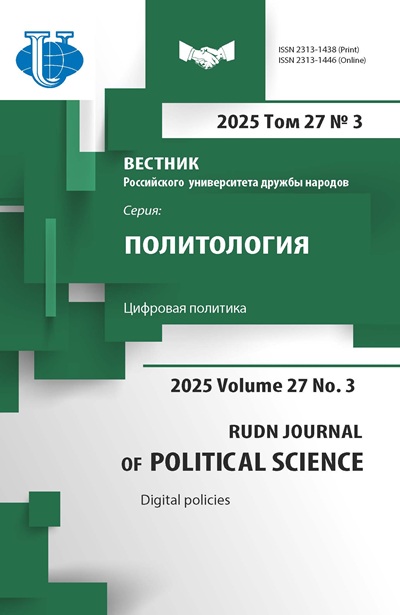Network Discourse of Patriotic Online Communities in Modern Russia: Problematic Field and Axiological Modes
- Авторлар: Kozlova N.N.1, Rassadin S.V.1
-
Мекемелер:
- Tver State University
- Шығарылым: Том 27, № 3 (2025): Digital policies
- Беттер: 494-506
- Бөлім: POLITICS ONLINE
- URL: https://journal-vniispk.ru/2313-1438/article/view/348832
- DOI: https://doi.org/10.22363/2313-1438-2025-27-3-494-506
- EDN: https://elibrary.ru/NYPIQM
- ID: 348832
Дәйексөз келтіру
Толық мәтін
Аннотация
Online communities in social networks have become a vital tool for constructing the value sphere in the last decade. The study presents a study of the problematic content field of the popular patriotic communities “Donetsk / Lugansk / Novorossiya”, “Nikolai Starikov”, “History: Russia and the World” in the aspect of their axiological modes. Publications were selected for each community by continuously uploading data for February 2021, 2022, and 2024, which were processed using the Conceptoscope analytical complex; contextual analysis was performed on keywords, as well as graph-based analysis. The study showed that the problem field of communities consists of several blocks: 1) historical meta-narrative, 2) Russia - the West 3) Ukraine, SMO 4) internal policy of the Russian Federation 5) natural beauty of Russia. The authors conclude that since February 2022, the problematic field of the analyzed communities’ content has been significantly expanded due to the topic of a Special Military Operation (hereinafter referred to as SMO), which is interpreted as an act of protecting the country. The need for consolidation and mobilization of Russian society is actualized; a positive attitude towards SMO becomes a criterion for identifying patriotic forces. In the February 2024 content, the structure of the problem field remains, but the rhetoric of Western double standards is intensifying, the idea of a multipolar world and a new architecture of international relations is being pedaled, as well as the discourse of glorification, patriotism and traditional values is progressing, and the idea of cleansing Russia from internal enemies is gaining momentum. The problem field of the communities is based on the values of a common historical memory, the idea of the sovereignty of the Russian state, the uniqueness of Russian civilization, the consolidation of the Russian world, the enduring nature of traditional values, the condemnation of the axiological foundations of the Western world, the principles of its organization. The successful production and promotion of patriotic content of the analyzed thematic online communities is determined by using an integrated approach combining historical narrative and current events, analytical articles and emotionally saturated materials. It is this approach that makes it possible to give positive axiological modes to patriotism and make it one of the leading factors of socio-political life.
Негізгі сөздер
Авторлар туралы
Natalia Kozlova
Tver State University
Хат алмасуға жауапты Автор.
Email: tver-rapn@mail.ru
ORCID iD: 0000-0003-1212-6412
Dr.Sc. (Political Science) - Associate Professor, Head of the Department of Political Studies, Institute of Economics and Management
Tver, Russian FederationSergey Rassadin
Tver State University
Email: s_r08@mail.ru
ORCID iD: 0000-0002-3478-0792
PhD in Philosophy - associate Professor of the Department of Political Studies, associate Professor
Tver, Russian FederationӘдебиет тізімі
- Aseeva, T.A., & Shashkova, Ya.Yu. (2021). Perception of patriotism by schoolchildren of the Siberian federal district. RUDN journal of political science, 23(1), 118–129. (In Russian). https://doi.org/10.22363/2313-1438-2021-23-1-118-129 EDN: IBUPPT
- Druckman, D. (1994). Nationalism, patriotism, and group loyalty: a social-psychological perspective. Mershon International Studies Review, 38(1), 43–68. https://doi.org/10.2307/222610
- Fairclough, N. (1995). Media Discourse. London; New York: E. Arnold.
- Goode, J.P. (2016). Everyday Patriotism and Putin’s Foreign Policy. PONARS Eurasia Policy Memo, 432, 1–7. Retrieved from https://ponarseurasia.org/wp-content/uploads/attachments/Pepm432_Goode_July2016 %282 %29_2.pdf
- Latyshevskii, S.I. (2017). The contribution of patriotism in the current ideology of Russia. Theories and problems of political research, 6(3А), 208–216. (In Russian). EDN: ZRPIMR
- Lubsky, A.V. (2017). Civil patriotism: about the compatibility of patriotism and civic consciousness in Russian society. Humanities of the south of Russia, 23(1), 42–59. (In Russian). EDN: XXJBVH
- Martynov, M.Yu., Fadeyeva, L.A., & Gaberkorn, A.I. (2020). Patriotism as political discourse in contemporary Russia. Polis. Political studies, 2, 109–121. (In Russian). https://doi org/10.17976/jpps/2020.02.08. EDN: WUIELN
- Martynov, M.Yu., & Gaberkorn, A.I. (2021). Patriotic discourse in «New media» ideological trends in modern Russia. Bulletin of Moscow region state university, 4, 104–120. (In Russian). https://doi.org/10.18384/2224-0209-2021-4-1097 EDN: XYKDDR
- Moy, P., & Scheufele, D.A. (2000). Media Effects on Political and Social Trust. Journalism & Mass, Communication Quarterly, 77(4), 744–759. https://doi.org/10.1177/107769900007700403
- Nathanson, S. (1993). Patriotism, Morality, and Peace. Lanham: Rowman & Littlefield.
- Olaniran, B., Williams, I. (2020). Social Media Effects: Hijacking Democracy and Civility in Civic Engagement. Jones, J., & Trice, M. (Eds.), Platforms, Protests, and the Challenge of Networked Democracy. Rhetoric, Politics and Society. Palgrave Macmillan, Cham, 77–94. https://doi.org/10.1007/978-3-030-36525-7_5
- Papastephanou, M. (2013). Inward and Outward Patriotism. Review of European Studies, 5(2), 20–32. https://doi.org/10.5539/res.v5n2p20
- Parma, R.V. (2024). Promoting the patriotic agenda on social media among Russian students. Higher education in Russia, 33(1), 44–67. (In Russian). https://doi.org/ 10.31992/0869-3617-2024-33-1-44-67. EDN: LLCBSO
- Patriotism in Philosophical and Political Perspectives. (2016). Ed. by I. Primoratz, A. Pavkovic. London; New York: Routledge.
- Pavlov, A.V. (2018). Patriotism. Very brief history of the idea. Philosophical anthropology, 4(1), 175–191. (In Russian). https://doi.org/10.21146/2414-3715-2018-4-1-175-191 EDN: UWJFMN
- Persily, N., & Tucker, J.A. (2020). Social Media and Democracy: The State of the Field, Prospects for Reform. Cambridge University Press.
- Primoratz, I. Patriotism (2009). Stanford Encyclopedia of Philosophy. Retrieved from https://plato.stanford.edu/entries/patriotism/ (date of request —12.12.2024)
- Rastorguev, S.V. (2024). Modern approaches to the concept of patriotism in scientific discourse. The Authority, 32(1), 96–101. (In Russian). https://doi.org/10.24412/2071-5358-2024-1-96-101 EDN: EIGTMD
- Rutland, P. (2015). Petronation? Oil, Gas and National Identity in Russia. Post-Soviet Affairs, 31(6), 66–89. https://doi.org/10.1080/1060586X.2014.952537
- Uyzbayeva, A.А., Sagikyzy, A., Akhmetova, G.G., & Kozhamzharova, M.Z. (2014). On the methodology of studying the phenomenon of patriotism. European Journal of Science and Theology, 10(6), 217–224. EDN: XNLDGD
- White, D. (2015). Political Opposition in Russia: The Challenges of Mobilization and the Political-Civil Society Nexus. East European Politics, 31(3), 314–325. https://doi.org/10.1080/21599165.2014.990628
Қосымша файлдар








